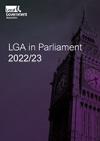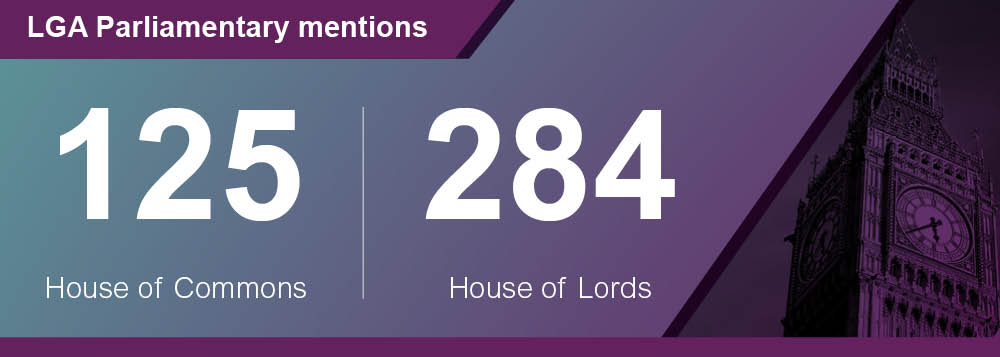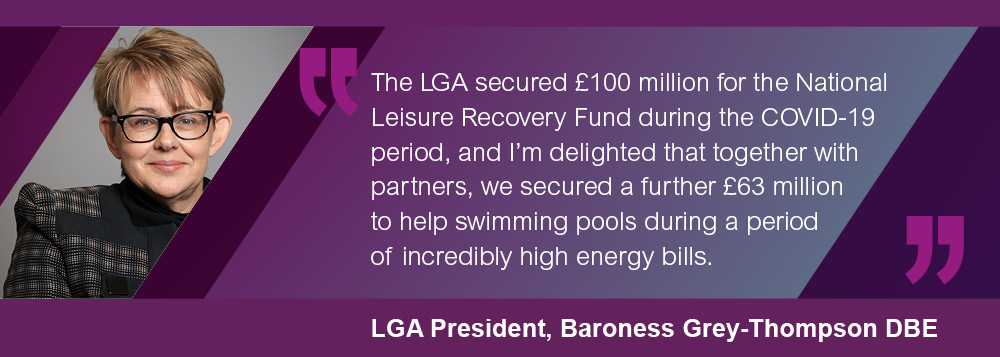We have helped deliver this through:
Legislation
Terrorism (Protection of Premises) Draft Bill
The Deputy Chair of the LGA’s Safer and Stronger Communities Board, Councillor Clive Woodbridge, gave oral evidence to the Home Affairs Committee on the Terrorism (Protection of Premises) Draft Bill (Martyn’s Law), as part of its pre-legislative scrutiny in June 2023. Cllr Woodbridge stated that the LGA is broadly in support of the Government’s approach and the principle of proportionality. He highlighted the new responsibilities the Bill would place on councils, including the need to collaborate with partner organisations, having to field queries from local groups on their responsibilities under the Bill, and the need to invest in skills and capacity to ensure venues are compliant with the new regulations. We also submitted written evidence to the Committee to expand on these points, and our evidence was subsequently used in the Committee’s final report.
Victims and Prisoners Bill
Before the Bill was introduced, Councillor Nesil Caliskan, then Chair of the LGA’s Safer and Stronger Communities Board, gave evidence to the Justice Committee who undertook pre-legislative scrutiny of the Bill. The Government introduced several of the Justice Committee’s recommendations, which Cllr Caliskan advocated for in her evidence to the Committee. These included the Victims Commissioner retaining responsibility for oversight of the Victims Code (instead of this being passed to Police and Crime Commissioners) and expanding the Bill’s definition of a victim to include children.
We also briefed MPs ahead of the second reading of the Victims and Prisoners Bill and Cllr Jeanie Bell, member of the Safer and Stronger Communities Board, gave oral evidence on our behalf to the House of Commons Bill Committee at Committee stage.
Online Safety Bill
We briefed MPs and peers throughout every stage of the Online Safety Bill.
Along with other stakeholders, the LGA has lobbied for a risk-based approach that would permit smaller platforms to be placed in category 1, as such platforms can have significant local reach, can contribute to issues around misinformation, host extremist material or represent a risk to children and young people.
Inquiries
Effective responses to destitution
In January 2023, Councillor Emily O’Brien, Deputy Chair of the LGA’s People and Places Board, gave evidence to the APPG on Ending the Need for Food Banks’ inquiry on effective responses to destitution. Cllr O’Brien set out that the national benefits system should provide the principal safety net, and that the demand for local crisis support is currently so high because the national system is not meeting people’s essential costs.
Gambling regulation
In February 2023, the LGA submitted written evidence to the Culture, Media and Sport Committee’s inquiry into gambling regulation. The LGA called for more flexibility to allow local democratically elected councillors to control the number of gambling premises, if such decisions can be shown to be in the interests of the local economy and community.
Digital exclusion and the cost of living
At the beginning of March 2023, the LGA submitted written evidence to the Communications and Digital Committee’s inquiry into digital exclusion and the cost of living. The LGA reaffirmed its view that the Government should adequately resource the national benefits system so that it provides the principal safety net for all low-income households and covers households’ basic needs, which should include digital access. Our evidence was subsequently mentioned throughout the Committee’s final report.
Asylum transformation programme
At the end of June 2023, the LGA submitted written evidence to the Public Accounts Committee’s inquiry into the asylum transformation programme. The LGA has been firm in arguing that the best way to meet the needs of asylum seekers and refugees is through a cross programme approach that uses, and funds, strategic and operational expertise in councils and their local and regional partners. We also highlighted in our response that we would welcome better join-up with and across the Department for Levelling up, Housing and Communities and with the Home Office’s Prevent disruptions team on addressing cohesion concerns, community tensions, on countering extremism and tackling harmful influencers.
Debates
The impact of the cost of living on the public wellbeing
In October 2022, we briefed ahead of a House of Lords debate, tabled by Baroness Drake (Labour), on the impact of the cost of living on the public wellbeing. The LGA highlighted escalating concerns over the rising costs of essentials such as fuel and food, which were pushing many households into immediate hardship.
Tackling poverty and the cost of food
In March 2023, we briefed ahead of a House of Commons debate on tackling poverty and the cost of food. Our briefing highlighted that rising inflation, stagnant wages, and benefit cuts are increasing food insecurity in the UK.
We urged government to reform the benefits system as a primary safety net and introduce measures like expanding access to healthy start vouchers and free school meals for all children in food poverty, ensuring long-term socio-economic benefits.
Homelessness among Ukrainian refugees in the UK
We briefed MPs ahead of a debate in March 2023 on homelessness among Ukrainian refugees in the UK.
Human trafficking and modern slavery
At the end of March 2023, we briefed MPs ahead of a Westminster Hall debate on human trafficking and modern slavery. The LGA also referenced work on establishing a national network of council officers working on modern slavery to share learning and best practice and discuss common challenges of working on this issue.
Anti-social behaviour (ASB) in town centres
In April 2023, we briefed MPs ahead of a Westminster Hall debate on anti-social behaviour in town centres. We emphasised that councils are keen to protect all victims and that we recognise that anti-social behaviour has a devastating impact on communities and families. We stated that councils are looking forward to seeing more details of how the Government’s ASB action plan will work in practice, as well as how the plan will be funded.
Government migration policies
A Backbench Business Committee debate on the Government’s migration policies was moved by Dan Carden MP (Labour, Liverpool, Walton) in June 2023. The LGA has, throughout the year, briefed extensively in this area, especially in relation to the Illegal Migration Bill, the accommodation of asylum-seeking children in hotels, wider housing issues, and human trafficking. With regard to the Illegal Migration Bill, the LGA stressed throughout its passage through Parliament that the Bill adds extra complexity to areas seeking to manage pressures on local services.
The LGA also consistently highlighted significant concerns about capacity to accommodate unaccompanied children.
Violence against women and girls in the UK
We briefed Peers ahead of a general debate in the House of Lords on ‘violence against women and girls in the UK’. We emphasised council’s commitment to tackle violence against women and girls and our willingness to work alongside police and criminal justice services, Police and Crime Commissioners, health, and education services as well as VCS to ensure they are protected from all forms of abuse.
In-work poverty
In June 2023, the LGA briefed MPs ahead of a Westminster Hall debate on in-work poverty. The briefing highlighted that jobs in the UK, instead of being a source of stability, are failing many.
The LGA advocates for its
Work Local model, providing local leaders with resources to integrate employment, skills training, and community outreach.
Building safety and social housing six years since the Grenfell Tower tragedy
We briefed MPs ahead of a general debate on building safety and social housing to mark six years since the Grenfell Tower tragedy. We briefed that, with the deadline for registration of high-rise residential buildings with the Building Safety Regulator coming up in October 2023 and the new building safety regime coming into place in April 2024, stock-owning councils are still awaiting clarity on the measures that will be expected of them as part of the safety case process.
Credit unions and the cost of living
In July 2023, we briefed ahead of a Westminster Hall debate on Credit Unions and the cost of living. The briefing highlighted that the UK's financial sector historically has not catered well for many low-income households.
Questions
- In a House of Lords debate on Business and Planning Act 2020 (Pavement Licences) (Coronavirus) (Amendment) Regulations 2023, Baroness Taylor of Stevenage (Labour) mentioned the LGA’s long held view that councils should be able to determine costs relating to the recovery of issuing licenses post-COVID-19. She went on to ask the Government to give further consideration to this when licensing measures become permanent as part of the Bill.
- In a House of Commons debate on Building Safety and Social Housing, Paula Barker MP (Labour, Liverpool, Wavertree) asked the Government to heed the calls of the LGA that councils and fire and rescue services need clarity on what is expected of them as regulators alongside the Building Safety Regulator. She asked for updates from the Government on secondary legislation which still needed to be approved by Parliament to implement and deliver the new building safety regime.
- In an answer to a question from Lord Young of Cookham CH (Conservative) on the engagement with the tobacco industry, Lord Markham CBE (Conservative) mentioned that DHSC had written to other Government Departments who may engage with the tobacco industry to inform them of the publication of ‘Guidance for government engagement with the tobacco industry' that was published 19 June 2023. He further mentioned that a version of that guidance tailored to local authorities, developed in collaboration with the LGA would be published shortly.
Events
APPG for domestic violence and abuse
In July, Councillor Clive Woodbridge, Deputy Chair of the Safer and Stronger Communities Board, spoke to the APPG for Domestic Violence and Abuse about the Domestic Abuse Act 2021. He first stated our support for the Act and its objectives, especially regarding its inclusion of a statutory definition of domestic abuse and the funding allocated to councils for the provision of accommodation-based support for survivors. He outlined the significant challenges that remain in this space, especially that demand for support services continues to outstrip supply.
APPG for Gambling Related Harms inquiry into the launch of the Gambling Reform White Paper
We submitted a letter to the APPG for Gambling Related Harms which stated that councils do not have the powers they need to effectively manage local gambling premises. We called for additional powers to allow councillors to restrict the opening of new gambling premises in places where it may not be appropriate to open a gambling venue.

















